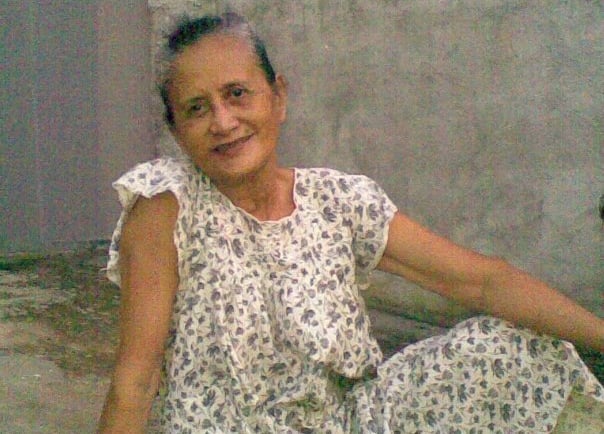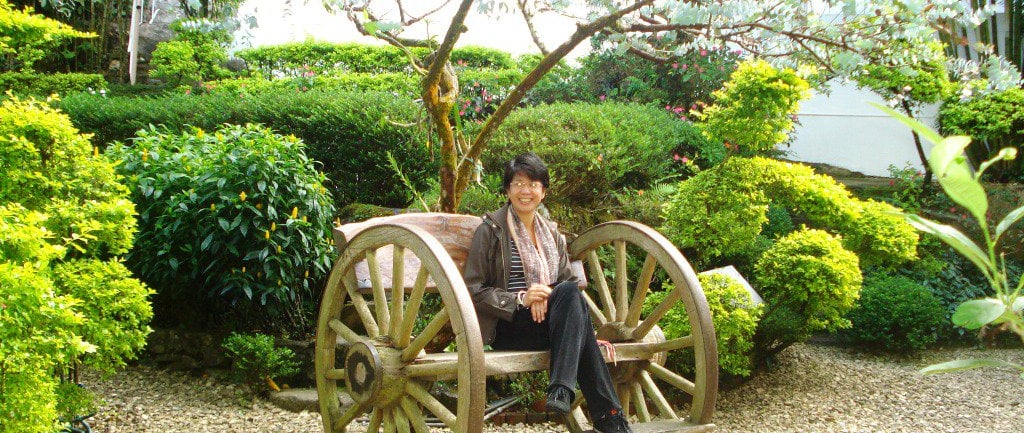My Midlife Call
PERSONALCREATIVE NON-FICTION


“I do not think it is mortality that seizes you at midlife. Nor is it anxiousness about your accomplishments. What consumes you is, rather the challenge of self-understanding – to know in your heart, independently, what kind of person you have become, and then to reconcile with this person and to figure out what needs to be done in the remaining years to make this idiosyncratic life hopefully a work of art.” Randy David, Public Lives
THIS ESSAY WAS WRITTEN WHEN MY MOTHER WAS STILL ALIVE. SHE HAS BEEN WITH THE LORD SINCE JUNE OF 2010
My mother has a pinched lumbar nerve in her lower back
My mother suffers from a pinched lumbar nerve in her lower back, causing her pain not only there, but also in her hips, buttocks, and legs. Her doctor described it as a withered plant, explaining that no amount of care would revive it. When she walks, she concentrates on each step, but she sometimes loses her balance and trips. She now uses a cane, and leans on me for additional support.
Despite her illness slowing her down, she's determined to maintain her routine. This morning, we went to the market. She considers it good exercise. After getting off the jeepney, she carefully made her way to the meat and fish stalls, bought chicken, pork, and milkfish from her usual vendors, and then we slowly moved towards the vegetable and fruit sections. Once home, she meticulously organized everything in the refrigerator, as always. For lunch, she cooked sinigang, fried chicken, and rice.
Even on Saturdays, she's up before 6:00 am, folding laundry or dusting. Her motto is to complete tasks on time; otherwise, our small apartment would become even more cluttered with unfinished chores.
One time, we returned from the hospital to find our house in complete disarray. She had been hospitalized for five days due to radiation therapy-induced intestinal ulcers. Upon arriving home, she immediately went to water her plants. I cleaned the windows, dusted the tables, mopped the stairs, and cleared away cobwebs. A pile of dirty clothes awaited washing. We immediately began cleaning. My mother led the effort and continued until she was satisfied. By nighttime, I felt relieved, knowing she could sleep peacefully, free from pests.
Recently, I've realized I need to take on more of her household responsibilities. I've suggested she retire from housework, but she insists, “If I stop, everything will stop.” She fills her days with slow, deliberate routines.
My mother insists on maintaining order in the house
My mother is determined to keep our house in order. Every day, she meticulously scrubs the floors and sweeps every corner. She also has a knack for repurposing anything that seems worn out. In our house, no scrap of cloth goes to waste; she transforms them into seat covers, coasters, tablecloths, bed sheets, and dusters. She sews together fabric scraps, creating unique designs that remind me of trapunto quilting. When we were toddlers, she even turned her old 1950s dresses into diapers and baby clothes. (She loved the fashion of that era, especially the style of her idol, Gloria Romero. Those dresses required three yards of fabric for the balloon skirts alone, and the petticoats became sturdy bed sheets for each of us.)
Pale yellow curtains drape softly in our living room, complementing the new brown and brick checker seat covers she made. These touches give our small living room a cozy, rustic feel. She's also filled the area near the gate with potted bougainvilleas, five-finger plants, and various san francisco varieties.
At sixty-six, she wakes up at four and starts her day by watering her plants, a ritual she repeats at sunset. While my mind often wanders, searching for meaning in the grander scheme of things, she finds her passion and joy in the everyday tasks. In her home, I find a sense of peace, a respite from the questions that plague me. Her patched curtains and intricately designed throw pillows speak of a quiet coherence. Simple, provincial, and practical, the atmosphere at home anchors me, bringing my scattered thoughts to a central point.
My mother's middle years
In her forties, my mother was a whirlwind of 'ordinary' tasks: single-handedly raising five children and selling beauty products to support us. She sewed pieces of baby dresses, cooked and sold packed pancit and sa malamig to nearby offices, and collected old bottles and newspapers to sell for our morning coffee and pandesal.
I often think of her during this midlife period.
We were at the hospital, awaiting her thyroid operation. She had hoped my father would be there. He hadn't been home in months, a pattern that stretched back many years. He missed my birth, my sister's death, and the time my brother got lost at the market.
During a pre-op checkup, my mother discovered my father's infidelity. She immediately located his address and took me with her to 'visit.' We arrived to find his mistress, a mestiza nightclub dancer, filing her nails, and their child.
My father emerged, and my mother slapped him, nearly hitting him with a wooden statue. The mestiza ran for the phone. My mother swung her umbrella, striking her. The woman screamed, and the child wailed, calling for 'mama.' People pulled my mother away, throwing her out. My father slammed the door in her face. She cursed him and his mistress. I begged her to stop, and she finally noticed me. She caught her breath, and we returned to the hospital for her operation. She held back her tears.
I remember her in midlife.
One early morning, our landlord pounded on our door. He wanted us out. My mother didn't beg; she negotiated for another month, during which she searched tirelessly for a new home. We found an old, bahay kubo-style house. My mother fixed the plumbing, reinforced the stairs, polished the bamboo floors, replaced the window panes, scrubbed the wooden steps, cleaned the capiz windows, did the laundry, sold beauty products door-to-door, and rocked my youngest sister to sleep.
Every morning in that house, we woke to a prepared breakfast, our patched and mended school uniforms ready, and our bags packed with pastries to sell to classmates. On Sundays, she'd have me iron a week's worth of laundry, my only contribution to the endless chores. During this time, she was a top-selling beauty consultant.
Peeping through a gap in my middle-age
My mother rarely had friends over for casual chats or gossip. Instead, she often took us to my grandparents' old house in the barrio. Those trips were her moments of respite, where she found comfort in her family and the slower pace of life. The old house was sparsely furnished: a long, heavy narra table with two matching benches, an old baul, three mats, and a tapayan.
I have fond memories of reunions with my cousins at that old house. Being the eldest, I'd often look out the window at the younger ones running up and down the hill. Though we were forbidden to go to the beach, we'd sneak off anyway, collecting shells and the black and red seeds of the dama de noche plant. My mother watched us as we climbed the sineguelas tree and napped under the camachile. After hours of play, when we were tired and covered in dirt, she'd bathe us by the well. I can still taste the salt in that well water.
When I was three, my mother told me I'd often peek through a crack in the sawali wall to make sure she was still by the well. She'd place me where I could see her while she washed the clothes. I'd watch her through that small gap, reassured that she hadn't gone far. She said I was always quiet then, watching until she was finished.
Now, peeking through that memory, I feel an overwhelming sense of love and care as I watch her sew used garments, clean the house, and water her plants. I remain still and quiet, secure in her presence. I see her embracing every moment, filling our home with warmth and vibrant colors.
(c) April 8, 2003/ February 25, 2004/May 25, 2024, January 16, 2025


Gather your journal entries into memoir pages
there is a time for everything and a season for every activity under the heavens


